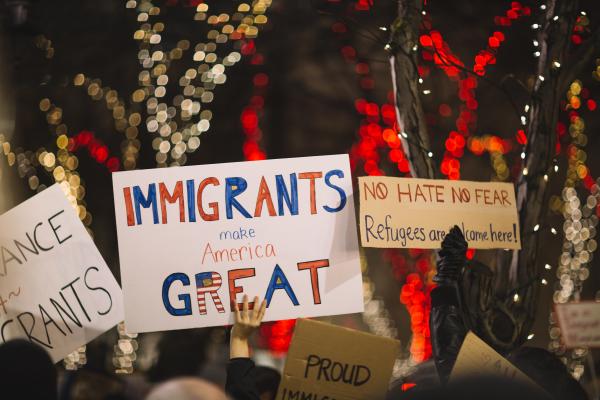The other day I happened to visit our local farmers market. I’d been feeling particularly disheartened for our country that afternoon. I hadn’t been to the market in a while and felt revived by the life and beauty I found there — the scent of fresh strawberries and peaches; all the locally grown avocados, carrots, broccoli, and bok choy; the fresh bread and cookies; the homies from Homeboy Bakery; the farmers and families; the sounds of some girls raving next to me in French about all the sweets on a stand in front of us. The place was teeming with color and life, the fruit of the earth, and the fruit of lovely people’s labor. I made a note to self: When despairing for our country and our planet — visit the farmers market.
There has been too much to grieve and despair over lately. We’ve all seen the images of children in cages, heard the recordings of their cries, and listened to the distress of parents who don’t know where their babies are. If it wasn’t clear to some of us before, it’s got to be all too clear now — we as a country are not who we often claim to be or think we are.
I’m thankful beyond words that I got to grow up in the U.S. and that I get to live in Southern California, a place with so much beauty and spirit, and probably the best Korean food on the planet, outside of Korea. I believe America is beautiful. But as our poet-prophet James Baldwin pointed out, one can both “love America more than any other country in this world” and “insist on the right to criticize her perpetually.” In fact, love demands honesty, truth-speaking, and open-eyed critique.
Baldwin wrote expansively on our country’s character, and what he wrote about our tendency to cling to delusions of innocence still holds true today:
It has always been much easier (because it has always seemed much safer) to give a name to the evil without than to locate the terror within ... we are unbelievably ignorant concerning what goes on in our country—to say nothing of what goes on in the rest of the world. ... We have, as it seems to me, a very curious sense of reality—or, rather. ... a striking addiction to irreality. (1964)
We’d all like to blame other folks for the circus we’re finding ourselves in now, but the truth is that Donald Trump and his administration are thoroughly American and homegrown. As many writers and activists have been reminding us, they’re merely the face of what much of America has historically stood for — might over right, the security of the few over justice and mercy for the many, and the justification of racial and economic oppression in the name of “law and order.”
I can both love my country and grieve its actions, past and present, at home and abroad. The U.S. was planted in violence and continues to thrive on violence. We know that from our history, a history of colonial conquest and land theft, slavery, militaristic policing, mass incarceration, and immigration laws that have been racist since the inception of the country — from the Naturalization Act of 1790 through the Chinese Exclusion Act and beyond. While it offers astounding opportunity for human thriving, our country has also always had a penchant for abusing power and treating people as disposable. We’ve been locking up youth, the poor, and the undocumented in harsh conditions for years, not to mention all the ways we’ve contributed to the unlivable conditions in other countries, with both aggressive economic policies and political intervention. The latest news of children being separated from their families is simply among the most currently visible and notably outrageous of our government’s actions in the name of our interests and security.
We in the church have clung too tightly to our country’s myths of exceptionalism. We’ve been too slow to name the real “terror within” and unwilling to listen to those telling us of terror all around. We’ve been reluctant to own up to our history and speak out against unjust policies. We don’t like to think or talk about it, but most of us know that our quality of life here comes directly at the expense of everyone else on the planet (not to mention the planet itself), millions of ordinary folks whose countries have been ravaged by centuries of colonialism and persistent neocolonial structures, who make our clothes and gadgets, grow our food and coffee, and pay in countless other ways for all our out-of-control consumption and addictions. Their problems are our problems. So we can’t set them aside.
In particular, those of us who claim to follow the poor, Middle Eastern God-man who taught us to give away our possessions, feed the hungry, welcome the stranger, and love one another can’t ignore Jesus in the stranger, Jesus on the street, or in the “detention center.” We can’t ignore that Christ embraces and abides with “the least of these,” or the fact that we habitually mistreat, lock up, and deport Christ and those dear to him. We’re called to a different way.
We might begin with the work of facing the truth of who we are, of being present to the full reality of ourselves and our country. We need to look squarely at reality, at our own churches and our own souls, and deal with the discomfort or pain of what we find there. We need to awaken to both the beauty and the ugliness within, the shadow as well as the light. Sadly, as Thomas Merton put it, “We are not very good at recognizing illusions, least of all the ones we cherish about ourselves.”
It can be terrifying to examine what we cherish about ourselves. But this is the work we’re called to first. We make others pay every day that we refuse to do this work.
At the farmers market last week, I felt a mixture of gratitude and heaviness of heart as I took in all the sights, scents, tastes, and sounds. I was grateful to be able to buy nectarines and strawberries for my family, cinnamon bread, and a big M&M cookie for my son. I also ached for all the traumatized children and parents here and around the world. I thought especially of the many whose suffering is tied to my life and the life of my country.
I couldn’t help thinking then, in the middle of all the colorful market stands and communal bustle, of Ursula Le Guin’s haunting gem of a story, The Ones Who Walk Away from Omelas. In it, we come upon the gorgeous coastal city of Omelas on a festival day. Life in Omelas is joyous and idyllic, full of brilliance, peace, and contentment.
The elaborate description of the city seems over-the-top at first, fairy-tale-like. Then the narrator stops to hail the reader, “Do you believe? Do you accept the festival, the city, the joy? No? Then let me describe one more thing.”
We learn that there’s a tiny, closet-like cellar somewhere below the city, where a child is kept. “It looks about six, but actually is nearly ten. It is feeble-minded. Perhaps it was born defective, or perhaps it has become imbecile through fear.” The child “can remember sunlight and its mother’s voice.” It occasionally cries to be let out, promising to “be good.” Everyone in Omelas knows the child is there. Their youth learn that the beauty and prosperity of the city would “be destroyed” were the child released. Helping or even comforting the child in any way would be “to throw away the happiness of thousands for the chance of the one.” Those are simply the terms of their universe. While they all experience shock and rage at the injustice of the situation when they first learn of it, they eventually grow to accept the terms of their world and abide with the conditions they’re given.
This grim underside makes the existence of Omelas seem “more credible.” And then we read of something “quite incredible.” At times, individuals here and there will “walk down the street alone,” and keep on walking, out of the city, into the darkness, “and they do not come back.” They always go alone. Their fate is unknown and unimaginable. These are “the ones who walk away from Omelas.”
In reality, none of us can simply walk away from our worlds or the messes we’ve made. Even if we wanted to, even if we decided to leave it all behind, we’d find our Omelas has spread too far abroad and stems from too deep within. And now we’ve seen the child. Literally. The crying child. In the cage. And we know enough about other stifling, soul-crushing cages that have been set up here and around the globe with our resources and for our benefit. We’ve caught a glimpse of the terror, and we can’t say we didn’t know.
Often the mess feels too vast, the powers that be too invincible, the systems too set in stone. I tend to feel helpless and want to throw my hands up in the air and say we’re all too far gone. But as a friend reminded me recently, despair is not an option. We may not be able to undo entrenched, complex systems of oppression all at once. We may not be able to give or do very much because of our own needs and schedules, our own health issues or daily heartache, and the littleness we feel regarding our own power and influence. Personally, I struggle to push back against my doomsday tendency to despair, to trust and feed hope, to keep shaking my fist and making a fuss. I need my more hopeful and sensible friends to spur me on. None of us can do it all, but we can all do something.
As many of us pause to gather on the Fourth of July, I wonder if perhaps we can celebrate without embracing myths or ignoring unpleasant truths. And as we carry on with life after the fireworks are over, will we be willing to do the soul work of facing who we are? Who are we? Who do we want to be? Can we stop and listen to the child, and love, and walk into the dark, toward becoming something unfathomably new?
Got something to say about what you're reading? We value your feedback!






